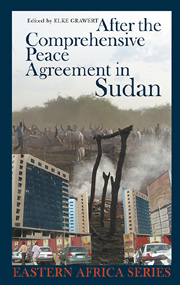Book contents
- Frontmatter
- Contents
- List of Tables & Figures
- Editor's Preface
- Notes on Contributors
- List of Acronyms
- Map of Sudan
- 1 Introduction
- I Implementation & Potential of the CPA
- II Challenges Facing Post-war Societies in Sudan
- III The CPA in its Sub-regional Context
- 11 Changes in Gambella, Ethiopia after the CPA
- 12 Ethiopian Federalism Seen from the Regional State of Gambella
- 13 From CPA to DPA
- 14 Challenges of Sub-regional Peace after the CPA
- IV Beyond the CPA
- Index
- EASTERN AFRICAN STUDIES
14 - Challenges of Sub-regional Peace after the CPA
from III - The CPA in its Sub-regional Context
Published online by Cambridge University Press: 05 April 2013
- Frontmatter
- Contents
- List of Tables & Figures
- Editor's Preface
- Notes on Contributors
- List of Acronyms
- Map of Sudan
- 1 Introduction
- I Implementation & Potential of the CPA
- II Challenges Facing Post-war Societies in Sudan
- III The CPA in its Sub-regional Context
- 11 Changes in Gambella, Ethiopia after the CPA
- 12 Ethiopian Federalism Seen from the Regional State of Gambella
- 13 From CPA to DPA
- 14 Challenges of Sub-regional Peace after the CPA
- IV Beyond the CPA
- Index
- EASTERN AFRICAN STUDIES
Summary
Introduction
The conclusion of the CPA is not only the merit of the two warring parties – the GOS and the SPLM/A – but also an outcome of the commitment of the IGAD, the special envoy of the Kenyan government, General Lazaro Sumbeiywo, and the IGAD Partners’ Forum which includes the governments of the United States, Norway, the Netherlands, Canada, Italy and the UN. This success has been overshadowed by the war in Darfur. Moreover, two years after signing the CPA, a speech by the southern Sudanese President Salva Kiir on the occasion of the anniversary of the CPA brought some fundamental shortcomings in its implementation to light, namely, the failure to clarify the border between southern and northern Sudan, to complete the disarmament of militias, and to create transparency about oil revenues.
Has the peace process come to a standstill? Is the war in Darfur related to the peace in southern Sudan? How does the mixture of war and peace in Sudan affect the sub-region of North-East Africa? What are the challenges for the institutions that had been involved in creating the CPA? In order to answer these questions, conflict and peace in Sudan are investigated with a concept of ‘space’ (Bourdieu 1985; Löw 2001) that is linked with the ‘New Regionalism Approach’ (Grant/Söderbaum 2003). Instead of a state-centred perspective, the current developments will be studied with a focus on economic, social, cultural, and political spaces where micro-, meso- and sub-regional as well as global arenas of action are interlinked.
- Type
- Chapter
- Information
- After the Comprehensive Peace Agreement in Sudan , pp. 241 - 262Publisher: Boydell & BrewerPrint publication year: 2010



